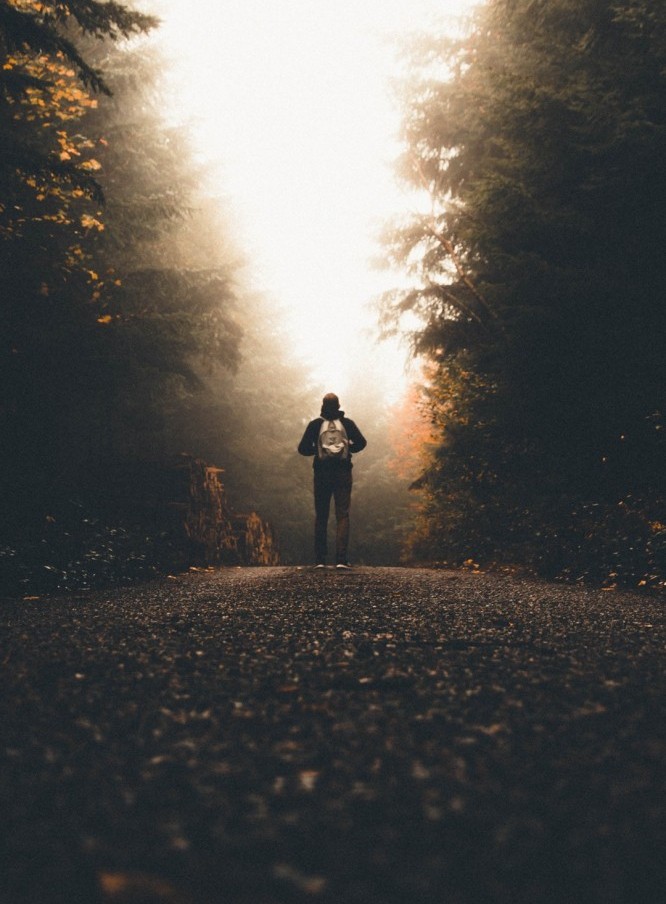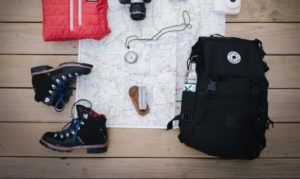Prepping for beginners- How to get started

Prepping for beginners. Some would call it a hobby, some would say it is just their lifestyle. However you look at it for yourself, it can always seem overwhelming for a beginner. Where do you start? What should you do? Is prepping too expensive?
One of the common misconceptions for some people is that prepping is just buying a lot of crap that will somehow help you to survive and eat well while doing it. The most important part of prepping is mental and emotional stability. No matter how much stuff you have, if you run around like Chicken Little thinking the sky is falling, you are going to end up hurting yourself or others.
Prepping for beginners. Getting your head in the game!
Bad things happen. It is a part of life. Being a person who can make the best of a situation will always drastically improve your chances in life. Prepping is no different.
90-degree weather with a storm coming down is a really bad time to lose power. It becomes almost unbearable with a complainer in the group. The person who doesn’t like this or that or feels somehow that their misery becomes less if they share it with the group.
Not everyone is a born leader who can take charge no matter what happens. It’s hard to step up and lead when fear, frustration, and exhausting have a hold of you. It becomes even harder when the choices you make could actually mean the difference between someone living and dying. Part of prepping is learning your limits and the limits of the surrounding people before those limits are called into question.
Prepping should always be a family activity. You need the people in your group or home to be on board in order to make plans work. The A-team always had a plan that they loved to see come together. The only reason that it did come together was that everyone did their part and worked together. Delegation and assignment of responsibility should be figured out beforehand as much as feasible. Apathy and laziness are the two biggest plan killers. The inability to act during an Alaskan summer might mean the inability to eat during an Alaskan winter.
Prepping really does become a preemptive lifestyle. Going through life avoiding as many of the pitfalls as possible while learning to climb out of the ones you can’t fully avoid. Training and gaining knowledge is always the best way to deal with the emergencies of life.
If someone pushed you into a swimming pool and you could swim you might be able to laugh about it if you weren’t holding your phone! Not knowing how to swim makes the situation completely different. That little piece of knowledge and know-how makes all the difference in that scenario.
I encourage you to start learning about prepping. Visit several prepping websites to get different takes on all the issues you might one day be forced to face. Pick up valuable training like basic first aid, camping, swimming, CPR, fire building etc. Return often for more updates here on all things concerning prepping.
Removing environmental obstacles.
When people begin to prep and look at the surrounding environment, they start to find the hidden dangers. One of the biggest dangers might be where you work or live. During a time of civil unrest, it may not be in your best interest to live downtown. Would you feel safe living where you do right now if the economy crashed and everyone was fighting for food and survival?
Others live in great places for being safe from Urban meltdown. The problem they face is that they work in a place that is problematic if things were to go downhill. It might be that you work in a city surrounded by millions of people. How would you get home to your place in the country If something like an earthquake destroyed most of the infrastructure? An hour-long drive could end up taking days on foot.
Maybe you work on the family farm twenty miles from the nearest town. You have all the water from your own personal well and acre after acre of food in your own backyard. You are ideally in a situation that plenty of preppers would love to find themselves in. Self-sufficiency is the key. But the problem is the town has a nuclear power plant just past it that supplies electricity to the whole county. What are your plans for bugging out if a tornado, hurricane, or earthquake made the plant unstable? Being so secure and stable in your living situation might be your downfall of not planning ahead if your farm became compromised.
When things go bad people panic. The roads may quickly become jam-packed. Looting or rioting can break out. If there is a fear of food running out, there may be a run on the stores. Looting has more to do with the opportunity to get away with taking what you want, not necessarily need it.
Stores have long since gotten rid of the storerooms with rows and rows of merchandise. They all have warehouses that micromanage transactions and deliver smaller amounts to each store as items are purchased. The last figures I had heard was that stores have about enough food in them to feed a community for only 3 days. Every man, woman, and child could go through the food in the local grocery stores in as little as three days. Let that sink in. Your local community could be out of food and hungry in under a week.
The surrounding infrastructure must always be thought of. Do you live in a city that gets its water from the mountains? If that supply chain were to break how would you survive? In a lot of places, they have made it illegal to collect rainwater saying that it messes with the water table.
The opposite could be the problem. Maybe you are surrounded by too much water. Would the breaking of a dam cause your house to be washed away? I know a place like St. Louis is actually surrounded by rivers on all sides. If you wanted to leave the city and county you would have to find a way to cross the river if the bridges went down.
How would you get home during a time of crisis? How would you leave home if leaving was your best option? I wrote a post that would help about bug out bags that can be found here! There are a thousand different variables that should be taken into consideration when choosing where to work and live. It isn’t all about the neighborhood and schools. However, there will always be risks no matter where in the world you choose to live. One of the reasons people prep is to help alleviate the problems or at least become willing to face those problems head-on.
How training makes you a better prepper.
Before I mentioned being pushed into a pool. Swimming is a basic skill that anyone can pick up that would make a huge step forward in a person’s ability to survive several situations. I believe there are several basic things that preppers should know in order to help them out in an emergency. Here I listed a few to help get you started.
- How to swim
- Basic first aid
- How to make a fire
- How to find water
- How to read a map
- Several methods to purify water
- Finding or creating a shelter
- CPR
- Heimlich Maneuver
- Basic firearm skills
There are other things that will help your group as a whole. I believe in personal responsibility for one’s own safety but the group as a whole will need to have some things in place for them to do well also.
- A plan. Answer who, what, when, where, how.
- Who. A list of people who you do and don’t want in your group if things go bad.
- What. Have a plan to answer each major problem of what could go wrong. Dealing with a tornado is different from how you would handle Russia invading.
- When. When does the group meet up or bug out to a new location?
- Where. Where do you want everyone to meet? That answer might be different based on several factors including time. You might say everyone meets at my house, unless there is a crisis for more than 48 hours, then bug out to uncle Mike’s farm
- How is everyone communicating and getting where they are going.
- Duties and rolls if SHTF (stuff* hits the fan)
- Who is picking up mom?
- Who is in charge of communications.
- Who is picking up the kids or are they old enough to make it home alone.
- Who is driving if bugging out?
- Who is hosting the group if everyone has to get out of town?
- Who is in charge of security.
- Who is feeding the group?
- Practice
- Practice drills like what you do in case of a tornado
- Roleplay what you want your kids to do in a crisis so that they have the training to look back on.
- Drive routes to look for obvious problems that might arise during different crisis.
- Routes
- Have more than one route that you would take to bug out or to get home.
- Check routes for obvious issues that could arise based on each different crisis. You want to avoid routes with bridges for example during an earthquake aftermath. Avoid routed with water if flash flooding is an issue.
- know what the routes for each member is in case you have to go help or find them.
- Communications
- Have a way to talk to each other. Each member of a party could have a walkie-talkie set to a certain channel that everyone uses in an emergency.
- Have locations on a route that people can leave a message if the phones aren’t working. Something like we are heading to Mike’s farm.
- Have a coded way to talk if for some reason you didn’t want to be followed. Maybe you don’t want to let the creepy neighbor in his bathrobe know you are heading to your moms. Maybe something like placing a brick in your mailbox might let the people in your group know where you are heading.
Conclusion
Prepping isn’t about having all the answers to all the problems that life can throw at you. Prepping is more about knowledge and having a game plan ready to go to make a group of people as ready as possible to work together during a crisis. Food, shelter, water, and a plan are all needed in a crisis.
Having basic training, an organized group, and a plan will bring stability and safety to your group. It helps with productivity and the ability to survive the worst. The reason a rescue swimmer can save a stranded diver is because of his training and know how. He did the basic prepping in order to save someone else. That is all we are really talking about here. Just being ready and willing to make it through life’s challenges. Start talking with the people in your group about a plan of action if life were to take a turn for the worse. -D. W. Mann






How to swimBasic first aidHow to make a fireHow to find waterHow to read a mapSeveral methods to purify waterFinding or creating a shelterCPRHeimlich ManeuverBasic firearm skills
These are just some awesome ideas to look into. This article really makes people think about preparing for different things.Thanks for the article.It for sure will help people to get ahead in the game in USA.
A little bit of prevention can make a huge difference when faced with one of life’s challenges. I am really glad that it helped you to think about the different areas that you might want to look into further to make sure you are ready.
I think you also need to make a hard decision on who you want to include into your group too DW.
For instance taking a morbidly obese 50 year old woman hell bent on criticizing everyone and everything when you have to move fast will bring the entire group into peril.
There is a lot to be said for a taste of realism when planning for an emergency.
Keep up the good work. I will be back.
I am going to put a post together about group dynamics for sure. I totally agree with what you said. There are people you will absolutely want to get involved with group activities and those you won’t. Also running to a campground with no WiFi for a weekend will show you what a lot of people are actually made of.
Thank you for the accurate and knowledge based post. I was intrigued while reading the post because of its indepth wealth of knowledge being disseminated. From swimbasic first aidhow, to making a fireHow and also to methods to read a map to purifing waterFinding. All these are just golden pieces of information which would be a guaranteed need at one point in an adventurers life like me.
thanks
I am really happy that you were able to find value in it. I will have more and more content like this over the next few weeks. Thanks.
This is a concise and informative blog post. You have thoroughly explained in details from different perspective for everyone digesting this post to understand the major points and tips shared in this article. prepping has been fun for ne infact its my favourite ever since i have learnt the tactics and made it part of me. You have said it all that basic trainings also help alot. Thanks for the eye opener. i learnt alot from your article
I am glad that you liked it. Check out my other articles and we have new posts coming all the time. Thanks!
It is very important to be a prepper for the things and situations in life such as learning how to swim and fetching water and learning to make a fire. Most importantly, learning to use effective communication is a plus! By training yourself and mind yo do these tasks, you will have a better chance of survival. Thank you very much for sharing this article!
Thank you for stopping by. I want my website to help people think through things that can happen in life and have a plan of action of at least where to start if something should happen.
Thank you so much for sharing all this wonderful info on Prepping! It is so appreciated, you always have good humor in your posts. I try as much as I can to study my limit in anywhere I find myself, this is helping me in preventing a lot of mess. I have really learnt a lot from your post on prepping especially on learning and acquiring knowledge. Thank you for the thorough research carried out. I already bookmark your page to get more of your updates.
Thank you for the kind comments. I don’t think everyone needs a bunker and hand grenades, but I do think they should at least have thought through a plan of action for their lives.
Wow DW – great list of things to think about for prepping! I’ve never got much farther than a bug-out bag of stuff to last me for about a week while I flee the area.
I’ll definitely be revisiting this list in the future.
Also, do you have any recommendations for if someone moves consistently (think every 6 months to a year) and travels a fair amount on top of that?
Thanks for the great post.
Having a bag in your vehicle with items I would call essentials would be the first step. Not everyone needs anything like a bunker. What is most important is a plan of action. When something goes wrong it is not the time to start figuring out how you should react to it. Here is another article that may help with what to have in your car,
https://preppingusa.com/prepper-supplies-focusing-on-supply-bags/
A well known soccer player was often quoted saying “fail to prepare prepare to fail”this is so true especially in relation to something bad happening to your family like a snowstorm where everything shuts down, communication, light, heat,water, food. If you live in a remote area it makes a lot of sense to learn to be self sufficient if you find that you may be locked in your house for a long time.
That is a very good point. The second good point you made was that location plays a major factor in the ways that someone should prepare. Thank you for the comments.
I will like to commend you for taking out time to write this article about prepping. I use to think that prepping is just all about study or reading. Now I know I was wrong, and that is actually more than that. I also see that prepping is a training on how to survive for a life time. And I also see it much more like a safety personnel
“Prepping” in general can mean just about anything in the form of being prepared. Learning to change a flat tire could be considered prepping. I think people need to take the time to at least consider the “What Ifs” of life. It will make life all that easier if something were to happen.
What Ifs” of life….thats true
Hi I wasn’t sure what contact you were meaning by prepping, but having read the article it I’d now clear and can easily be related to lots of aspects of life such as simply any goal setting and preparation both physically and mentally. There was an inferred link to the bug out bags, but nothing to click on so just a heads up if that was one of your links? Thanks for opening my mind and helping me understand this topic.
I hope you were able to to take something away from the post that you can use in everyday life. I am not sure what happened but the link is working for me when I tested it. I might have to relink it just in case. It was a link to this story if you are interested. Have a great day!
https://preppingusa.com/prepper-supplies-focusing-on-supply-bags/
Good stuff here. I think CPR, being able to create shelter and purifying water via different ways are crucial skills for people to have. A lot of people (I imagine) wouldn’t really know how to go about creating shelter if faced with an emergency. Finding it might be easy for some, but creating it could be a different story.
Another good thing to look into is learning how fire reacts in different environments. Learn how to maximize heat that you want without smoking yourself out of a temporary shelter. Thank you for reading my post and leaving a comment. Hope you found value in it.
I love the idea that prepping doesn’t help you solve all of life’s problems, but that it just helps you prepare by having enough knowledge and a good plan set out for when the emergencies and unexpected dramas in life happen, as they inevitably will! Thank you for sharing this really valuable information.
There is no way to be totally ready for all of life’s problems. The best I think anyone can do is have awareness of their limitations and try to develop skills that put them in the right frame of mind if something were to happen. Thanks for stopping by and commenting.
Very informative, this site is great, man. 👍 My mother and stepfather are preppers, not to the extreme, but living in Florida, they’ve recognized the importance of a bug-out plan. Besides have a few important military bases on this little peninsula, Florida regularly gets hit with hurricanes that have the potential to be heavily devastating.
I like the way you have the prepping thought process broken down and laid out into an easy to read outline, I have a feeling when my fiancee and I start hitting the road in our rv, (we live full time in a 36′ fifth wheel), I’ll be revisiting this site for ideas and things I hadn’t taken into consideration.
Thank you, very helpful!
The best part of your situation is the ability to get out of harm’s way when you need to. If you can always stay out front of the problem you will be doing just fine. You might want to come up with some plans for things that could happen that you can’t avoid like earthquakes. Thanks for reading my post and I hope you found some value in it.
I guess I wasn’t sure what you were prepping for until I read the whole article and a very good thing to consider this day and age. You just never know what life or the powers that be are going to throw our way and its best to have a plan in action for that day. This is some very good advice because as you said when sh*t hits the fan its best to be calm and execute the appropriate plan for that disaster.
The only thing we have control over in this life is ourselves. Even that can be a full-time job sometimes. You can face any challenge in life as the person who will make the situation better or the victim. When things go bad there will be enough victims so I want to help be the person that made things just a little better. Thanks for reading my post.
Wow this article is really useful. It teaches how to be proactive instead of reactive. Life is really full of suprises and learning how to survive is so much important. Shit happens but what makes the difference is how different people react to the different situations.
Prepping is good for everyone and i am someone who is all grown up but doesn’t know how to swim. I am learning though when I have a little free time and it can make so much difference in my life when I know how to swim well. The first aid part is very helpful for every situation and a bunch of skills comes in handy one way or the other. thanks so much for this article. It is a wake up call for me.
The reasoning behind all of my posts is just to get people thinking and maybe even take some basic actions on their part to learn their limitations. Once you know your limitations you can work on them. The best part of learning a skill like swimming is that not only is it a life saver but it really is a lot of fun! Playing in the water is a blast and I wish you all the best.
What if your wife doesn’t agree?